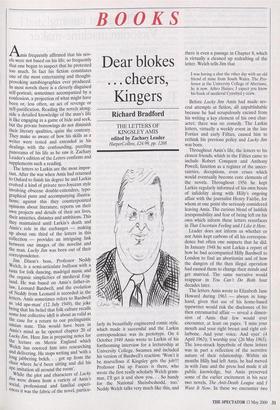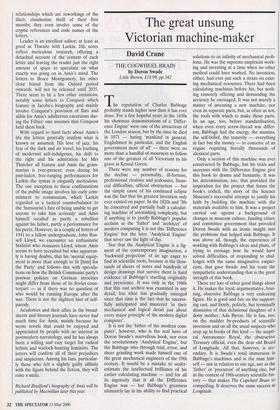BOOKS
Dear blokes . cheers, Kingers
Richard Bradford
THE LETTERS OF KINGSLEY AMIS edited by Zachary Leader HatperCollins, £24.99, pp. 1208 is frequently affirmed that his nov- els were not based on his life; so frequently that one began to suspect that he protested too much. In fact his fiction constitutes one of the most entertaining and thought- provoking autobiographies ever produced. In most novels there is a cleverly disguised self-portrait, sometimes accompanied by a confession, a projection of what might have been or, less often, an act of revenge or self-justification. Reading the novels along- side a detailed knowledge of the man's life is like engaging in a game of hide and seek, but the private borrowings do not diminish their literary qualities, quite the contrary. They make us aware of how his skills as a writer were tested and extended in his dealings with the confounding, puzzling panorama of his life as he saw it. Zachary Leader's edition of the Letters confirms and supplements such a reading. The letters to Larkin are the most impor- tant. After the war when Amis had returned to Oxford to finish his degree he and Larkin evolved a kind of private neo-Joycean style involving obscene double-entendres, typo- graphical puns and accompanying illustra- tions; against this they counterpointed opinions about literature, reports on their own projects and details of their sex lives, their anxieties, distastes and ambitions. This they maintained until Larkin's death and Amis's role in the exchanges — making up about one third of the letters in this collection — provides an intriguing link between our images of the novelist and the man. Lucky Jim was born out of their correspondence. Jim Dixon's boss, Professor Neddy Welch, is a semi-articulate buffoon with a taste for folk dancing, madrigal music and the organic simplicities of medieval Eng- land. He was based on Amis's father-in- law, Leonard Bardwell, and the evolution of Neddy from Leonard is recorded in the letters. Amis sometimes refers to Bardwell as :old ape-man' (12 July 1949), the joke being that his belief that folk culture recalls some lost collective idyll is about as valid as the case for a return to our prelinguistic simian state. This would have been in Amis's mind as he opened chapter 20 of Lucky Jim. Here Jim is preparing notes for the lecture on Morrie England which Welch has coerced him into researching and delivering. He stops writing and `with a long jabbering belch. . . got up from the Chair where he'd been sitting and did his ape imitation all around the room'. While the plot and characters of Lucky '11'11 were drawn from a variety of Aims's social, professional and familial experi- ences it was the fabric of the novel, particu- larly its beautifully engineered comic style, which made it successful and the Larkin correspondence was its prototype. On 6 October 1949 Amis wrote to Larkin of his forthcoming interview for a lectureship at University College, Swansea and included his version of Bardwell's reaction: 'Won't it be marvellous if Kingsley gets the job!!! Professor Dai ap Faeces is there, who wrote the first really scholarly Welch gram- mar, I'll get it and show you. . . So handy for the National Sheissbedsodd, too.' Neddy Welch talks very much like this, and there is even a passage in Chapter 8, which is virtually a cleaned up redrafting of the letter. Welch tells Jim that
was having a chat the other day with an old friend of mine from South Wales. The Pro- fessor at the University College of Abertawe, he is now. Athro Haines; I expect you know his book of medieval Cymrhyd y ceirw.
Before Lucky Jim Amis had made sev- eral attempts at fiction, all unpublishable because he had scrupulously excised from his writing a key element of his own char- acter; there was no comedy. The Larkin letters, virtually a weekly event in the late Forties and early Fifties, caused him to rethink his previous policy and Lucky Jim was born.
Throughout Amis's life, the letters to his closest friends, which in the Fifties came to include Robert Conquest and Anthony Powell, function as a register of the uncer- tainties, deceptions, even crises which would eventually become core elements of the novels. Throughout 1956 he kept Larkin regularly informed of his own bouts of infidelity along with Hilly's ongoing affair with the journalist Henry Fairlie, for whom at one point she seriously considered leaving Amis. The curious blend of laddish irresponsibility and fear of being left on his own which inform these letters resurfaces in That Uncertain Feeling and I Like it Here.
Leader does not inform us whether or not Amis kept carbons of all his correspon- dence but often one suspects that he did. In January 1948 he sent Larkin a report of how he had accompanied Hilly Bardwell to London to find an abortionist and of how the dangers of the then illegal operation had caused them to change their minds and get married. The same narrative would reappear in You Can't Do Both four decades later.
The letters Amis wrote to Elizabeth Jane Howard during 1963 — always in long- hand, given that use of his home-based typewriter would risk the disclosure of his then extramarital affair — reveal a dimen- sion of Amis that few would ever encounter, at least on paper. 'I miss your mouth and your right breast and right col- larbone. And your voice. And eyes' (4 April 1963); 'I worship you' (26 May 1963). The love-struck hyperbole of these letters was in part a reflection of the secretive nature of their relationship. Within six months Hilly had left Amis, he had moved in with Jane and the press had made it all public knowledge, but Amis preserved some of the earlier excitement in his next two novels, The Anti-Death League and I Want It Now. In these we encounter two relationships which are reworkings of the illicit, clandestine thrill of their first months; they even involve some of the cryptic references and code names of the letters.
Leader is an excellent editor; at least as good as Thwaite with Larkin. His notes reflect meticulous research, offering a detached account of the context of each letter and leaving the reader just the right amount of space to speculate on what exactly was going on in Amis's mind. The letters to Bruce Montgomery, his other close friend from the Oxford period onwards, will not be released until 2035. There seem to be a few other omissions, notably some letters to Conquest which feature in Jacobs's biography and mainly involve Conquest's provision of flats and alibis for Amis's adulterous excursions dur- ing the Fifties: one assumes that Conquest held them back.
With regard to hard facts about Amis's life the letters generally confirm what is known or assumed. His love of ja77, his fear of the dark and air travel, his loathing of modernist self-indulgence, his drift to the right and his admiration for Mrs Thatcher all feature and Amis the gram- marian is ever-present; even during his pun-laden, free-ranging performances for Larkin the syntax is elegantly meticulous. The one exception to these confirmations of the public image involves his early com- mitment to communism, which Larkin regarded as a tactical counterbalance to the 'humourist's fate of being unable to get anyone to take him seriously' and Amis himself recalled as partly a rebellion against his father, partly a performance for his peers. However, in a couple of letters of 1941 to a fellow undergraduate, John Rus- sell Lloyd, we encounter an enthusiastic Stalinist who reassures Lloyd, whom Amis seems to have recruited but who apparent- ly is having doubts, that his 'mental equip- ment is more than enough to fit [him] for the Party' and follows this with specula- tions on how the British Communist party's postwar policies on German atrocities might differ from those of its Soviet coun- terpart — as if there was no question of who would be running Europe after the war. There is not the slightest hint of self- parody.
Academics and their allies in the broad- sheets and literary journals have never had much time for Amis, mainly because he wrote novels that could be enjoyed and appreciated by people with no interest in postmodern narratology, and he has always been a willing and easy target for radical leftists and warlock-hunting feminists. The letters will confirm all of their prejudices and suspicions. Among his fans, particular- ly those who felt a slightly guilty affinity with the figure behind the fiction, they will raise a smile.
Richard Bradford's biography of Amis will be published by Macmillan later this year.



























































 Previous page
Previous page